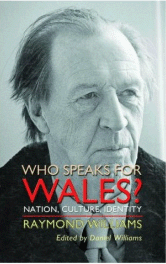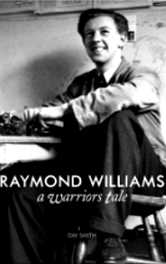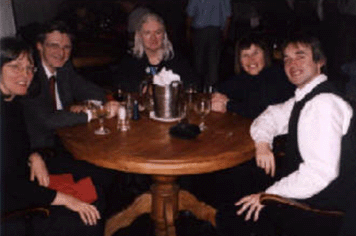An extensive collection of the papers of the distinguished cultural critic and writer, Raymond Williams (1921-88) were deposited at CREW in the Summer of 2007 and catalogued from 2010.
Prior to 2007 the collected papers of Raymond Williams had been retained privately by the Williams family estate, which restricted their use by scholars until the completion of Professor Dai Smith’s authorised biographical study The Warrior’s Tale (2008). While Williams’s stature as a leading intellectual of the European left waned following his untimely death, Dai Smith’s biography has since contributed to a perceptible pendulum swing. In recent years, Williams’s works have been revisited and revived by a new generation of British and international critics in an on-going 21st century renaissance of Williams studies.
The scholars at CREW include two prominent Raymond Williams specialists. Professor Daniel Williams’s Who Speaks for Wales? (2003) is a seminal collection of Williams’s writings on Wales’s cultures, while Professor Dai Smith is the author of A Warrior’s Tale (2008), a study of Williams’s life and writings down to the completion of Culture and Society. Through Professor Smith, the Centre has developed strong links with Williams’s daughter Merryn.
CREW will dedicate several future projects to the work of Raymond Williams and welcomes applications from postgraduate students and visiting scholars who wish to research in this field. We have been fortunate enough in recent years to receive visiting scholars from all over the world, including from as far afield as China and Japan, where the study of Williams’s work is flourishing


Raymond Williams (1921-1988)
A major intellectual figure of the twentieth-century, Williams is recognized worldwide as one of the founding figures of Cultural Studies. Of his ten books, the historic Culture and Society (1958) helped redefine the term ‘culture’ in terms Williams continued to explore through a series of seminal works – such as The Long Revolution(1961), Marxism and Literature (1977) and Towards 2000 (1983) – that gradually took on a distinctive and unorthodox Marxist character. His The Country and the City (1973) exposed the ideological underpinning of these crucial, interdependent, terms, while his Keywords (1976) remains an influential dictionary of words crucial to current social, cultural and political thinking. A fiction writer of power and stature, Williams produced seven novels – including Border Country (1960), Second Generation (1964), The Fight for Manod (1979) and People of the Black Mountains (posthumous) - alongside his prodigious critical output. Williams conceived of his creative and critical writing as twin means of exploring the complex character of the social and political processes involved in the formation of culture.

From left to right: Stevie Davies, M. Wynn Thomas, Gillian Clarke, Merryn Williams, Daniel Williams. Following a CREW research seminar in 2003 in which Merryn Williams discussed Raymond Williams’s life and background to his writings.
The Resource
The Papers
- The Archive is considerable in bulk and rich in its resource. Cataloguing began in 2010 and is now largely complete, although some of the more miscellaneous material continues to invite study and classification.
Creative work: amongst published material, both in manuscript and typescript, are:
- 5 complete and unpublished novels, c.1948-58
- 4 lengthy extant fragments of other unpublished novels
- c30 unpublished short stories
- 3 finished plays (unpublished) and numerous drafts of other dramas including completed film scripts for documentary and musical film
- Versions, in autograph and type, of early or late discarded work for Border Country (1960)
- Juvenilia as plays, stories, ideas
- Annotated typescript for four published novels from 1960 to 1988
- Research notes by Joy Williams for her husband’s massive and posthumous historical fiction, People of the Black Mountains, vols.1 and 2
- unpublished drafts of started novels, synopses and character genealogies from the 1940s to the 1980s, ranging from fragments to the published work
Critical works
- Again, in the papers, this was often written on the same sheets as other ideas as they occurred but, inter alia, are lists of books, notes, research data including statistical information, concepts, diagrammatic sketches (as for the famous concept of ‘structure of feeling’), unpublished Reports and Bibliographies from his Adult Education years (1946-61) and some undergraduate notes and essays (1939-41; 45-46)
- Early notes on Culture and Work that lead to Culture and Society (1958)
- Discarded material, at publisher’s request, from Culture and Society typescript of 1956: including complete early version of Keywords (and an appendix) and essays on Herbert Read and others.
- Lecture notes and outlines (from 1960 onwards)
- Various drafts of work for The Long Revolution (1961)
- Typescripts of critical published writings in 1970s and 1980s
- Correspondence with F.R. Leavis, E.P.Thompson, Richard Hoggart et al.
Notebooks
- There are a number of these but three in particular, dating from the late 1950s to the 1970s, demand close investigation. Here are set out, in rich and interlocking detail, the first glimmers, in thought and in drafts, of his most important works, both creative and critical. They undoubtedly unlock the processes of his critical practice, his imaginative thinking and his actual writing.
Miscellaneous
- Including published and unpublished memoirs and journalism, diaries and letters, jottings and postcards, political interventions, extensive newspaper cuttings of reviews and articles, correspondence with scholars, material gathered by Joy Williams, after her husband’s death.
Published material
- His complete works, from undergraduate work to maturity.
